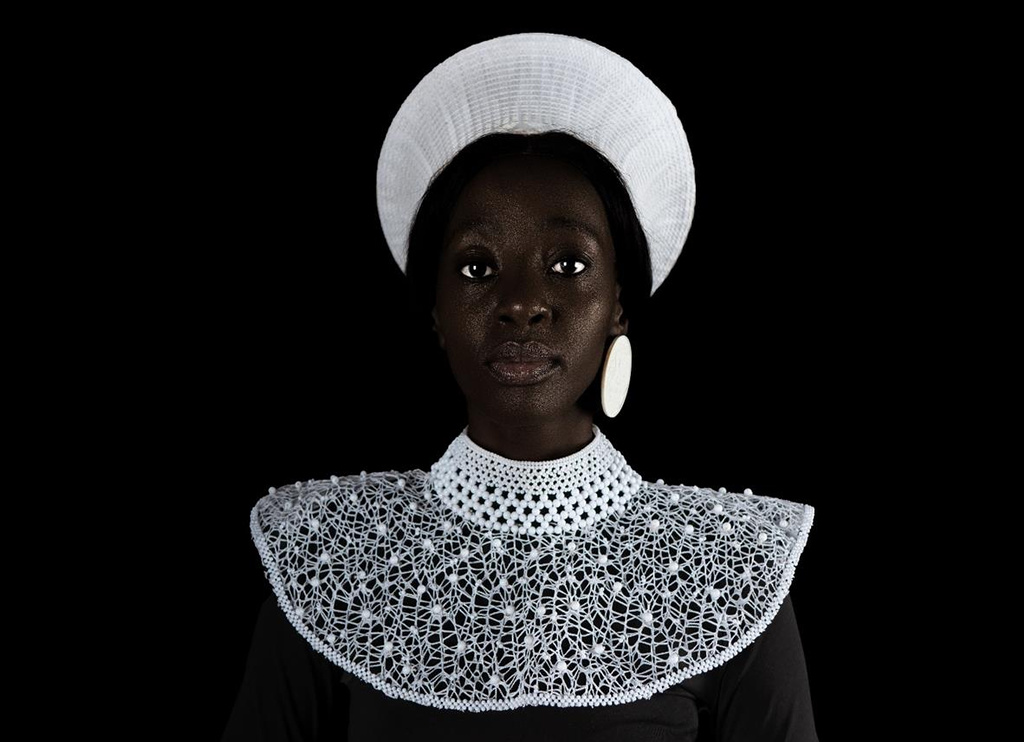In her exhibition honouring leaders across ten South African cultural groups, Khanya Mthethwa represents ancestors of the Xhosa, BaPedi and Zulu peoples through embroidered portraits and personal adornment.
“Abantu: Threads That Bind Us” is my personal celebration of South Africa’s diverse indigenous cultures, an intimate exploration of identity, and a tribute to the resilience of cultural memory. In this solo exhibition, I bridge the distance between the past and the present through artistic interpretations of archival materials and contemporary design, inviting you to reconnect with histories that remain alive in spirit yet often overlooked.
The exhibition unfolds across two levels. On the lower ground level, The Archive, I honour the richness of ancestral knowledge and craftsmanship. Featuring archival beadwork loaned from Wits Arts Museum and embroidered portraits of kings and cultural leaders, this space offers a reverent encounter with the legacies that have shaped South Africa’s indigenous identities. Here, history is not static; it is a conversation that continues to unfold.
From art jewellery and vases to re-staged photographic portraits of traditional attire, each piece speaks to the transformative power of remembering and reinterpreting. These works celebrate how the past lives on in the present, not as mere relics but as active agents of inspiration and identity. Through this exhibition, I seek to provide a space where those disconnected from their lineage can rediscover and celebrate it. “Abantu: Threads That Bind Us” invites you to consider how heritage shapes who we are and to celebrate the enduring threads of belonging that connect us all.
King Hintsa kaKhawuta (AmaXhosa)
- Khanya Mthethwa, King Hintsa kaKhawuta textile, blue and pink beads, cotton twill, canvas, natural Springbok hide, water colour paint and charcoal, 1 meter x 1 meter, 2024.
- Khanya Mthethwa, Xhosa umbhaco shirt, Siyabonga Mkhonza (model) medium size, 2024.
- Khanya Mthethwa, Siso Tom(Photographer, Ingcambu yobomi (Xhosa)[framed]), 2004.
Hintsa represents the violence and betrayal of colonial conquest. His murder during peace talks with British forces, and the unresolved history around the fate of his remains, stands as a powerful symbol of resistance and injustice. His legacy continues to speak to the trauma and dignity of the Xhosa people.
The portrait was created on cotton twill with image transfer, and then layered with canvas, natural springbok hide, blue and pink beads, watercolour paint, and charcoal. These materials evoke both regality and rupture, honouring his story with both tenderness and weight.
King Sekhukhune I (BaPedi)
- Khanya Mthethwa, King Sekukhune textile , Springbok hide, glass beads, cotton twill, image transfer, water colour paint and charcoal., 1 meter x 1 meter , 2024.
- Khanya Mthethwa, Siso Tom (Photographer ), Motso wa bophelo (Pedi) [framed], 2024.
Sekhukhune led the Bapedi in fierce resistance against both Boer and British forces, defending his kingdom’s independence from multiple colonial powers. His construction of the Thaba Sekhukhune fortress symbolised not only strategic brilliance but also the resolve to retain cultural and territorial sovereignty.
This textile combines springbok hide, cotton twill, image transfer, glass beads, watercolour paint, and charcoal. The use of hide symbolises the rugged terrain of resistance and leadership tied to land and protection.
King Shaka kaSenzangakhona (AmaZulu)
- Khanya Mthethwa, King Shaka textile, embroidery thread, cotton twill, beads, image transfer and water colour paint, 1 meter x 1 meter, 2024.
- Khanya Mthethwa, Siso Tom (Photographer), Impande yokuphila (Zulu) [unframed], 2024
Shaka’s legacy is foundational to Zulu identity, yet no authenticated image of him exists. By using a symbolic warrior rather than attempting to visually reconstruct him, the work reflects on how oral memory and symbolic presence carry historical weight beyond visual likeness.
This work uses cotton twill with image transfer, beads, embroidery thread, and watercolour. The textures layer memory, power, and myth — deliberately echoing the complexity of remembering Shaka without an image.
Khanya Mthethwa, Abantu – Threads That Bind Us, University of Johannesburg FADA Gallery, 6 March – 28 March 2025
About Khanya Mthethwa
 Khanya Mthethwa is a multi-award-winning jewellery designer born in KwaZulu-Natal, currently working as an academic at the University of Johannesburg. She holds a Master of Arts in Design, as well as certifications in Rough Diamond Evaluation and Diamond Cutting. She has submitted a PhD in Art History at the University of Johannesburg’s Department of Visual Art, with a focus on indigenous knowledge research methods, the coloniality of culture, and a decolonial stance. Her doctoral work is theoretical and rooted in critical cultural analysis. A jeweller by profession, Khanya is the founder and CEO of Changing Facets, a company that creates contemporary, wearable art jewellery. In 2023, she was awarded the prestigious Susan Beech Mid-Career Artist Grant, which enabled her to create Abantu: Threads That Bind Us. Her work has been exhibited in Croatia, Italy, Athens, Munich, and Estonia. Follow @changingfacets.
Khanya Mthethwa is a multi-award-winning jewellery designer born in KwaZulu-Natal, currently working as an academic at the University of Johannesburg. She holds a Master of Arts in Design, as well as certifications in Rough Diamond Evaluation and Diamond Cutting. She has submitted a PhD in Art History at the University of Johannesburg’s Department of Visual Art, with a focus on indigenous knowledge research methods, the coloniality of culture, and a decolonial stance. Her doctoral work is theoretical and rooted in critical cultural analysis. A jeweller by profession, Khanya is the founder and CEO of Changing Facets, a company that creates contemporary, wearable art jewellery. In 2023, she was awarded the prestigious Susan Beech Mid-Career Artist Grant, which enabled her to create Abantu: Threads That Bind Us. Her work has been exhibited in Croatia, Italy, Athens, Munich, and Estonia. Follow @changingfacets.










